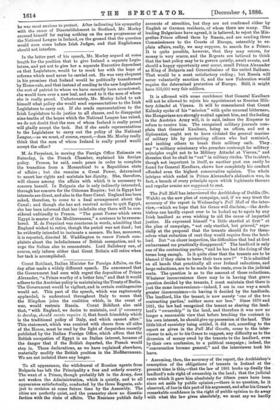The Pall Mall has interviewed the Archbishop of Dublin (Dr.
Walsh) on the new plan of campaign, and, if we may trust the accuracy of the report in Wednesday's Pall Mall of the inter- view,—which we hope that his Grace will disclaim,—the Arch- bishop can hardly expect ever to be looked up to again by any Irish landlord , as even wishing to aid the cause of impartial justice. He expressed himself "a little startled at first" at the plan of campaign, "not only startled, but grieved," espe- cially at the proposal that the tenants should fix for them- selves what reduction of rent they would require from the land- lord. But "on closer inspection, the difficulties that had at first embarrassed me practically disappeared." The landlord is only one of the contracting parties," and he has had the fixing of the terms long enough. Is it quite clear that the tenants are to be blamed if they claim to have their turn now P" "It is admitted on all hands that practically all over Ireland reductions, and large reductions, are to be made in the rents, even in the judicial rents. The question is as to the amount of those reductions. Whatever inconvenience there may be in having that grave question decided by the tenants, I must maintain that there is- just the same inconvenience—indeed, I see in one way a much greater inconvenience—in having it decided by the landlords. The landlord, like the tenant, is now merely one of the two contracting parties,' neither more nor less." Since 1870 and 1881, the law had recognised the tenant as sharing the land- lord's " ownership " in the land, and therefore it was now no longer a reasonable view that before breaking the contract in his own interest, he should give up possession of the land. This little bit of casuistry being settled, it did not, according to the report as given in the Pall Mal Gazette, occur to the inter- viewer to ask, or to his Grace to suggest, any difficulty as to the diversion of money owed by the tenants to the landlord, even by their own confession, to a political campaign ; indeed, the "conversation became general," and the interviewer took his leave.






































 Previous page
Previous page